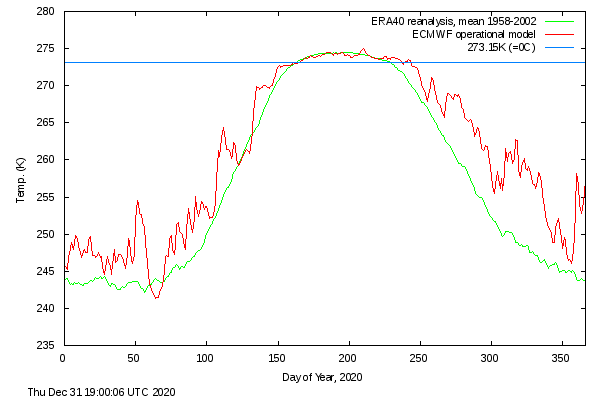Popped into this thread a few times, and I'm not sure whether "unusually cold" is referring to air aloft or temperatures at the surface?

Above is the daily mean temperature and climate north of the 80th northern parallel estimated from the average of the 00z and 12z ECM analysis for all model grid points inside that area.

Yes this is a little confusing. A few points to clear it up
a) DMI is only the region around the North pole not the arctic ocean as a whole. The north pole has been slightly less cold than, for example, the beaufort or barents.
b) Even above average can mean 'unusually cold'. The arctic is warming so rapidaly that every single year sees winter temperatures 10+C above the line on DMI. Compare it to some previous years and you will see what I mean! If you did, say, a linear fit of the arctic temperature over the last 40 or so years you'd get a steep positive line. 2020 would be well below that line though even if it is well above an average from the 80s, 90s or even 00s.
c) And even if there are positive anomolies over the arctic there are even higher positive anomolies on the NHem continents. Most recent winters you see insanely high positive anomolies in the arctic and neutral or negative anomolies on the continents. This year it has flipped.
Edited by user
30 January 2020 19:03:44
|
Reason: Not specified
Twitter: @QuantumOverlord (general), @MedicaneWatch (medicane/TC stuff)
2023/2024 Snow days (approx 850hpa temp):
29/11 (-6), 30/11 (-6), 02/12 (-5), 03/12 (-5), 04/12 (-3), 16/01 (-3), 18/01 (-8), 08/02 (-5)
Total: 8 days with snow/sleet falling.
2022/2023 Snow days (approx 850hpa temp):
18/12 (-1), 06/03 (-6), 08/03 (-8), 09/03 (-6), 10/03 (-8), 11/03 (-5), 14/03 (-6)
Total: 7 days with snow/sleet falling.
2021/2022 Snow days (approx 850hpa temp):
26/11 (-5), 27/11 (-7), 28/11 (-6), 02/12 (-6), 06/01 (-5), 07/01 (-6), 06/02 (-5), 19/02 (-5), 24/02 (-7), 30/03 (-7), 31/03 (-8), 01/04 (-8)
Total: 12 days with snow/sleet falling.